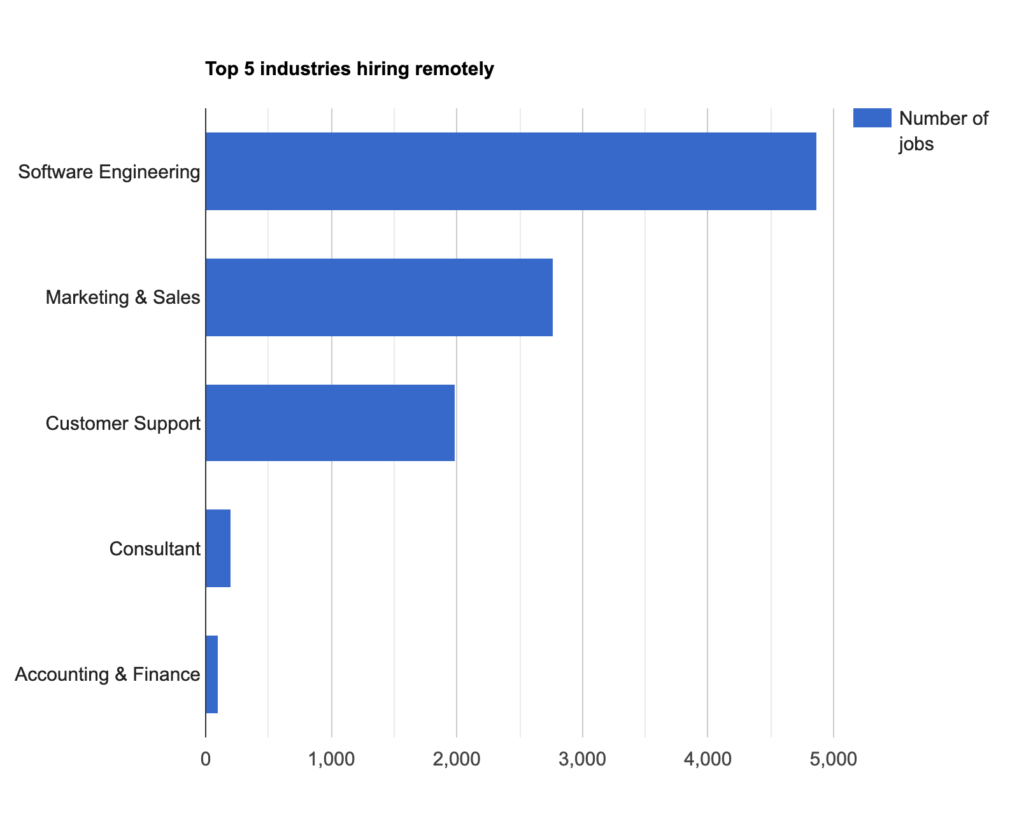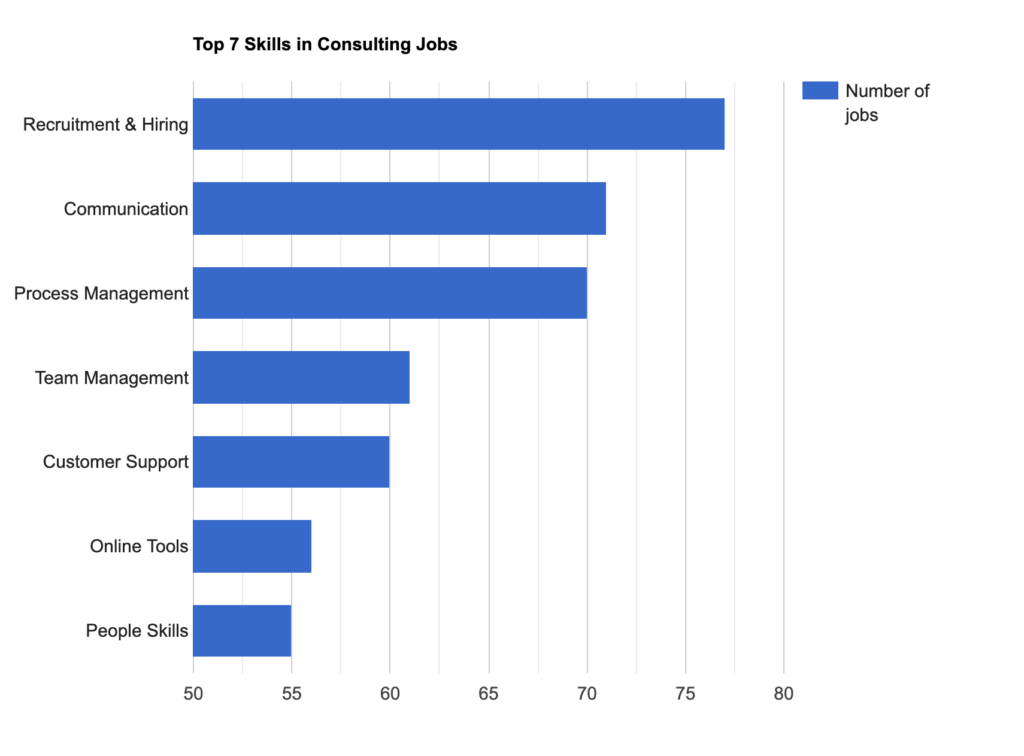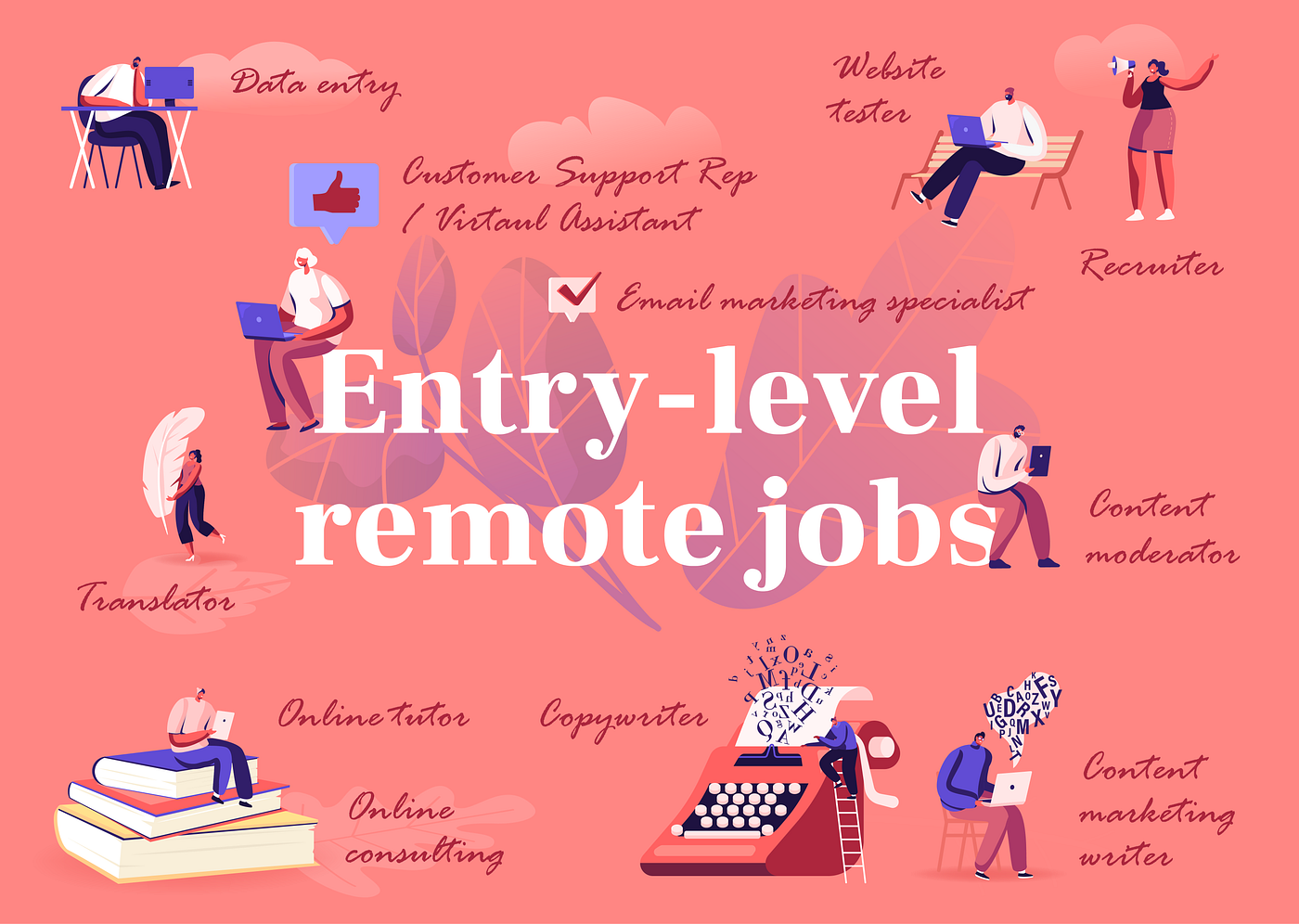Entry level remote jobs are available in various industries and offer opportunities for individuals to work from home. These jobs may require basic skills and experience, but can provide a stepping stone for career growth and development.
With the rise of the gig economy, more and more people are seeking remote work opportunities. Entry level remote jobs are a great way to get started with working from home. These jobs are available in a variety of industries, such as customer service, data entry, social media management, and virtual assisting.
While some of these jobs may require basic skills and experience, they can provide a stepping stone for career growth and development. In this blog post, we’ll explore some of the best entry level remote jobs available and provide tips on how to land them.

Credit: www.youtube.com
The Rise Of Remote Work
Remote work has become a prevalent and viable option for many job seekers, especially those looking for entry-level opportunities. The rise of remote work has been fueled by a shift in work culture and advancements in technology, making it possible for individuals to work from the comfort of their homes. In this article, we’ll explore the factors contributing to the rise of remote work and the entry-level opportunities it presents.
A Shift In Work Culture
The traditional 9-to-5 office culture has given way to a more flexible and remote-friendly work environment. Companies are recognizing the benefits of allowing employees to work remotely, including increased productivity, cost savings, and access to a wider talent pool. This shift in work culture has opened up numerous entry-level remote job opportunities across various industries.
Technological Advances Enabling Remote Work
The rapid advancement of technology has played a pivotal role in enabling remote work. High-speed internet, cloud-based collaboration tools, and video conferencing software have made it seamless for individuals to communicate and collaborate with their teams from any location. Additionally, the proliferation of project management platforms and virtual workspaces has facilitated efficient remote workflow management, further supporting the growth of entry-level remote positions.
Benefits Of Entry-level Remote Jobs
Entry-level remote jobs come with numerous benefits such as flexibility, cost savings, and the opportunity to gain experience in a chosen field. Remote work allows individuals to work from anywhere, which can improve work-life balance and reduce commuting expenses. Additionally, entry-level remote jobs can provide valuable experience and skill development for those starting their careers.
Work-life Balance
Remote jobs allow for a better balance between work and personal life.
Reduced Commuting Stress
Eliminating commuting saves time and reduces stress levels significantly.
Diverse Opportunities
Remote work opens up a wide range of job opportunities in various industries.
Remote jobs provide a flexible schedule and the ability to work from anywhere.
- Work-life balance: Remote jobs enable a better balance between work and personal life.
- Reduced commuting stress: Eliminating commuting saves time and reduces stress levels.
Work-life Balance
Remote jobs allow for a better balance between work and personal life.
| Benefits of Entry-Level Remote Jobs |
|---|
| Work-Life Balance |
| Reduced Commuting Stress |
| Diverse Opportunities |
Types Of Entry-level Remote Jobs
When it comes to entry-level remote jobs, there are several types that individuals can explore. These opportunities provide a great way for people to enter the workforce and gain valuable experience while working from the comfort of their own homes. Here are some of the most popular types of entry-level remote jobs:
Customer Service Roles
Customer service roles are in high demand for remote positions. Companies often seek individuals to assist customers via phone, email, or online chat. These roles typically involve addressing inquiries, resolving issues, and providing support to ensure customer satisfaction.
Content Creation And Writing
Content creation and writing roles encompass a wide range of opportunities such as copywriting, blogging, and social media management. Remote content creators are responsible for producing engaging and informative material for websites, marketing campaigns, and various digital platforms.
Data Entry And Analysis
Data entry and analysis roles are well-suited for remote work, as they often involve working with digital databases and spreadsheets. Individuals in these positions are responsible for inputting, organizing, and analyzing data to support business operations and decision-making processes.
Skills Required For Remote Work
Remote jobs demand specific skills to thrive in a virtual work environment.
Self-discipline And Time Management
Effective remote workers exhibit strong self-discipline and stellar time management skills.
Digital Communication Proficiency
Proficiency in digital communication tools is crucial for remote job success.
Basic Technical Know-how
A basic understanding of technical tools and systems is necessary for remote roles.
Finding The Right Remote Job
Finding entry level remote jobs can be a daunting task, but there are many resources available to help you navigate the process. Start by researching companies that offer remote work, and consider networking with professionals in your desired industry. With persistence and patience, you can find the right remote job for you.
Finding the Right Remote JobUtilizing Job Boards
Search for remote job opportunities on specialized job boards like FlexJobs and We Work Remotely.
Leveraging Social Media Networks
Engage with companies on LinkedIn and Twitter to discover remote job openings.
Networking And Referrals
Utilize your professional network and seek referrals for entry-level remote positions.

Credit: enhancv.com
Crafting A Remote-friendly Resume
When applying for entry-level remote jobs, crafting a remote-friendly resume is essential for standing out in the competitive job market. A remote-friendly resume should emphasize relevant skills, showcase remote work experience, and be optimized for applicant tracking systems (ATS).
Emphasizing Relevant Skills
Emphasizing relevant skills is crucial for a remote-friendly resume. Tailor the skills section to highlight those that are specifically relevant to remote work. Include technical skills, such as proficiency in remote collaboration tools, time management, and adaptability.
Showcasing Remote Work Experience
When crafting a remote-friendly resume, showcasing remote work experience is vital. Include any previous remote work experience, internships, or relevant projects. Emphasize accomplishments and outcomes from remote work to demonstrate your ability to excel in a remote environment.
Optimizing For Applicant Tracking Systems
Optimizing for Applicant Tracking Systems (ATS) is essential for your resume to get noticed. Use relevant keywords and phrases from the job description to increase the chances of your resume getting past the initial screening process. Tailoring your resume for ATS can improve its visibility to potential employers.
Preparing For Remote Job Interviews
Prepare effectively for entry-level remote job interviews by researching the company, practicing common interview questions, and ensuring a stable internet connection. Dress professionally, showcase your skills confidently, and highlight your eagerness to learn and grow within a remote work setting.
Mastering Virtual Interview Techniques
Practice using video conferencing tools for a smooth interview experience.
Ensure a quiet, well-lit space and test your equipment beforehand.
Understanding Remote Job Expectations
Research the company’s remote work policies and communication tools.
Be prepared to demonstrate your self-discipline and time management skills.
Questions To Ask Employers
What collaboration tools do remote teams use for project management?
Can you describe the onboarding process for remote employees?

Credit: enhancv.com
Challenges Of Entry-level Remote Jobs
Entering the world of remote work can be both exciting and daunting for entry-level professionals. While the prospect of flexibility and autonomy is appealing, there are unique challenges that come with working remotely, especially for those who are new to the virtual office environment. Overcoming isolation, navigating time zone differences, and managing distractions at home are key hurdles that entry-level remote workers often face.
Overcoming Isolation
Remote work can sometimes lead to feelings of isolation, as there may be limited opportunities for in-person interaction with colleagues. Building a support network through virtual communication platforms and participating in remote team activities can help combat feelings of loneliness and isolation.
Navigating Time Zone Differences
Dealing with time zone variations can present a significant challenge for entry-level remote workers, particularly when it comes to scheduling meetings and collaborating with colleagues from different geographic locations. Utilizing time zone conversion tools and establishing clear communication protocols can help minimize the impact of time zone differences on productivity.
Managing Distractions At Home
Working from home can expose entry-level remote workers to a myriad of distractions, ranging from household responsibilities to the allure of personal entertainment. Creating a dedicated workspace, setting boundaries with family members, and adhering to a structured daily routine can aid in managing and minimizing distractions while working remotely.
Career Growth In Remote Roles
Remote work has become an increasingly popular option for many job seekers, offering a myriad of entry-level opportunities. One of the key factors that make remote roles attractive is the potential for career growth. Despite the physical distance, individuals can still progress in their careers by setting professional goals, continuously learning and developing new skills, and seeking feedback and mentoring.
Setting Professional Goals
Setting professional goals is crucial for career growth in remote roles. It provides a sense of direction and purpose, helping individuals stay motivated and focused. Whether it’s aiming for a promotion, acquiring new certifications, or expanding one’s skill set, clear and achievable goals pave the way for advancement.
Continuous Learning And Skill Development
Continuous learning and skill development are essential in remote jobs. Embracing a growth mindset and actively seeking opportunities to enhance knowledge and expertise can lead to increased responsibilities and career progression. Online courses, webinars, and self-study can all contribute to professional development.
Seeking Feedback And Mentoring
Seeking feedback and mentoring are valuable components of career growth in remote roles. Constructive feedback enables individuals to identify areas for improvement, while mentoring provides guidance and support. Engaging with experienced professionals fosters personal and professional development, ultimately propelling individuals forward in their careers.
Maintaining Work-life Harmony
Achieving work-life harmony is essential, especially for those seeking entry-level remote jobs. Balancing professional responsibilities with personal well-being can lead to a fulfilling career and a satisfying personal life. Remote positions offer flexibility, making it easier to maintain this crucial balance.
Maintaining Work-Life Harmony Creating a Dedicated Workspace Setting up a designated area for work helps establish a routine. Include a comfortable chair, proper lighting, and minimal distractions. Establishing Clear Boundaries Clearly communicate your work hours with household members. Set boundaries to separate work time from personal time. Staying Physically and Mentally Healthy Take regular breaks to stretch, move around, and refresh your mind. Incorporate healthy snacks, hydrate frequently, and prioritize mental well-being. Opt for a standing desk or ergonomic chair to promote good posture. Implementing these strategies can greatly enhance your remote work experience.Frequently Asked Questions
Is It Possible To Work Remotely With No Experience?
Yes, it’s possible to work remotely with no experience in certain entry-level positions or freelance roles. Networking, showcasing skills, and seeking remote internships can help. Emphasize transferable skills and a strong work ethic in your applications.
What Is The Highest Paying Remote Job With No Experience?
The highest paying remote job with no experience is freelance writing, content creation, social media management, virtual assistant, and online tutoring.
Is It Hard To Get Hired For A Remote Job?
No, it’s not hard to get hired for a remote job. Many companies are embracing remote work, creating more opportunities. Showcase your skills and experience to stand out in the competitive remote job market. Networking and utilizing online job platforms can also help in securing a remote position.
How Do I Find My First Remote Job?
To find your first remote job, search on job boards, network on LinkedIn, and utilize remote job websites. Tailor your resume for remote work and prepare for virtual interviews.
Conclusion
In a world increasingly shifting towards remote work, entry-level remote jobs offer valuable opportunities. These roles provide flexibility, growth potential, and a chance to kickstart a rewarding career from anywhere. With the right skills and mindset, remote work can open doors to a bright professional future.



